L'avantage exclusif de Warpcasts devient de plus en plus évident, y a-t-il encore une chance sur Farcaster ?
Auteur original : Kaori , BlockBeats
Original editor: Jack , BlockBeats
Over the weekend, an article from Fortune magazine said that Farcaster would launch a token like most protocols, which helped Farcasters daily active users, which had been declining for nearly half a month, pick up again. On May 22, Farcaster completed a $150 million financing led by Paradigm with a valuation of nearly $1 billion. This news once again attracted attention to Farcaster and its largest front-end application Warpcast, which had attracted market attention at the beginning of the year. Daily active users reached a record high one day after the announcement of financing.

Last week, Voodoo, a well-known casual game publisher, spent 500 million euros to acquire BeReal, a social networking app for acquaintances, because it was attracted by the latters 40 million active users and growth model. Voodoo completed this acquisition with nearly one years revenue. No matter who the winner is, it shows that the user base and growth potential of social media platforms are very attractive to investors. This can also prove why Farcaster was able to complete a $150 million financing at a valuation of nearly $1 billion. Compared with TikToks valuation of 200 billion, 1 billion may be a reasonable expectation given by crypto VCs.
TikTok has been boycotted, Twitter and Facebook have been censoring and blocking accounts more and more seriously, and geopolitical and censorship issues have become the huge challenges that mainstream social media will inevitably face today. This situation has also given room for the rise of censorship-resistant and decentralized social products such as Mastodon and Farcaster. After Musk took over Twitter, the number of active users of Mastodon, which focuses on decentralized architecture, increased by 600% in less than a year.
But the Farcaster core team clearly stated that to win mainstream users, they must first win cryptocurrency, and Farcaster has only taken the first step. The financing news stimulates not only DAU, but developers also regard Farcaster as a hot spot, developing clients, building vertical applications, designing Frames, etc. For ordinary users, betting on Farcaster to issue coins and actively operating accounts is the easiest way to bet, but for a developer, recognizing the pattern of this ecosystem and getting involved may be the best choice.
Everyone is working for Warpcast
Warpcasts Frames feature brought it the first wave of mainstream user growth, but its control over core functions has made other clients only serve as spare tires. The difficulty of developing the Farcaster protocol, coupled with Warpcasts funding and user advantages, poses a huge challenge to third-party client developers. This competition is not only a competition of technology and functions, but also an exploration of the future of the decentralized social ecosystem. With the continued dominance of Warpcast and the rise of aggregated applications, the prospects of the Farcaster ecosystem are full of variables.
The most curly prince
On June 4, Nook, a Farcaster client that supports customized information flow, announced that it would stop developing, triggering a discussion in the Farcaster ecosystem about the survival of the client. Currently, the Farcaster protocol has more than a dozen front-end applications for users to choose from, with a total number of users exceeding 463,000, but more than 90% of users use the client Warpcast created by Merkle Manufactory, the Farcaster protocol development company.
In the Farcaster developer ecosystem, some people also realized that Warpcast is too monopolistic and has become a kind of shadow in this ecosystem.

Earlier this year, Warpcast gained its first wave of expansion potential by launching the Frames feature. Frames is similar to mini-programs in WeChat, allowing users to interact without leaving the app and unlock more scenarios. In addition to Frames, Warpcast also has several core features, such as Direct Casts and Channels.
This means that if you use a Farcaster protocol client other than Warpcast, you cannot send private messages to other users, and you can only browse channels but cannot publish content in channels. As a result, some front-end applications of the Farcaster protocol can only become spare tires to provide temporary emergency assistance when Warpcast goes down.
Developing a Farcaster protocol client is not an easy task. Dan, the founder of the Farcaster protocol and Warpcast, once said that it took about 20 people a year to develop Warpcast, and its core architecture is not much different from mainstream social apps. However, even so, Warpcast is not perfect in terms of algorithms, search, private messaging and other functions.
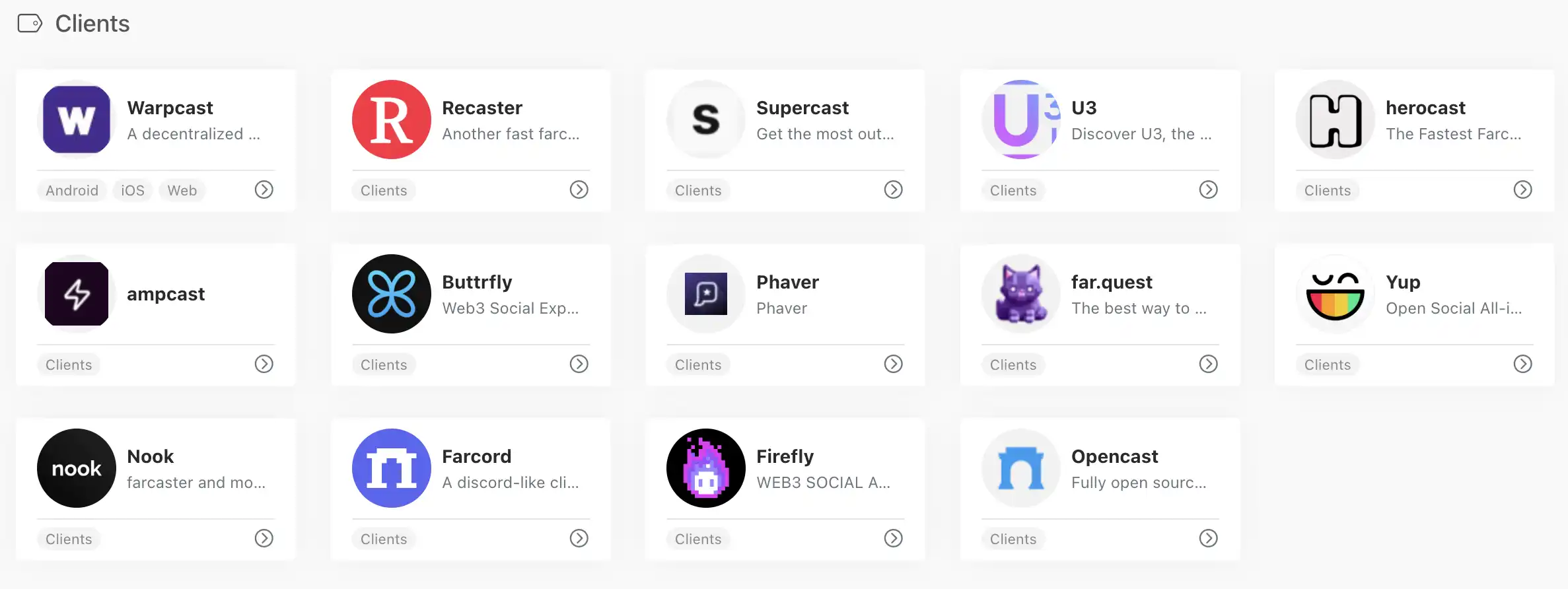
On the other hand, the other Farcaster clients were developed independently by small teams or even individuals. Some of these clients are to improve the functions of Warpcast. For example, Recaster has a built-in translation function for non-English users, and the Nook, which has been announced to be shut down, also has a special function of customizing information flow. Supercast, the second largest client of the Farcaster protocol, is praised for its lightweight operation and smoother user experience, but it is still not as popular as Warpcast in terms of user volume.
These clients are different from Warpcast and have innovated. There are also a steady stream of developers who are ambitious to create new Farcaster clients. However, behind them is the $150 million in new funds of the Warpcast team, and 90% of users use the Farcaster protocol through Warpcast. What makes the development cost even higher is that the Farcaster protocol is not open enough. A developer mentioned to BlockBeats that although the Farcaster protocol architecture is more friendly than Nostr and other protocols, the developer documentation is not complete enough compared to Web2, and the auxiliary materials in the development process are also limited.
In addition to having relatively complete functions and official protocol resource support, Warpcasts competition with third-party clients will also be affected by the inevitable historical trend of platform integration in the development of traditional Internet. Weibo, Twitter, Facebook, Instagram, LinkedIn, almost every mainstream Internet social application has a history of competing with third-party clients and winning.
Their third-party clients have performed well in terms of user experience and differentiated functions, but the official clients have enhanced their competitiveness by restricting API calls, mergers and acquisitions, etc., thus gradually taking a leading position in the competition. This may also become the competition path between Warpcast and Farcaster third-party clients in the future.
Nook founder Kartik said in the shutdown announcement that Farcaster is currently just a platform suitable for side projects, not a serious company, and he believes that no other client can compete with Warpcast. The alt version of Farcaster client can be innovative, but most of the time people just want to browse content and interact with other users. In my opinion, Warpcast is enough.
The founder of Airstack, the Farcaster protocol API service provider, also directly stated, Although anyone can build a client, there is actually no reason to do so unless you have some unique insights into user needs that have not yet been addressed by Warpcast.
The general view is that if you want to build a Farcaster client, there needs to be a strong enough pain point or demand that either moves a large number of users from Warpcast to your client, or new users join and stay in your client, or you can build a single truly valuable feature that Warpcast is unlikely to build on its own (e.g. streaming video, audio spaces), but which works seamlessly with Warpcast.
In short, trying to replace Warpcast is an irrational choice. Without an economic model, being a third-party client is more like working for the Warpcast team.
Aggregate applications further squeeze space
The challenges facing the growth of third-party clients do not only come from Warpcast. Application aggregation clients that are gaining more and more attention from the mainstream have also become strong competitors to the Farcaster ecosystem. As social protocols evolve and become more mature, content fragmentation will become a long-standing problem like liquidity fragmentation. The necessity of social aggregation has not yet been perceived on a large scale, but it is one of the core pain points of the decentralized social ecosystem.
Speaking of aggregated clients, the one with the deepest roots is Firefly, a social application owned by Mask Network. It has a wide range of features, not only aggregating decentralized social protocols such as Farcaster and Lens, but also connecting to Twitter API at a low cost because it was launched early enough. In addition, articles on Mirror and Paragraph can be browsed in the application. In the past two months, Buttrfly and Phaver, one of the largest front-end applications of another major social protocol Lens Protocol, also announced their access to the Farcaster protocol, allowing users to publish content to Farcaster and Lens at the same time.
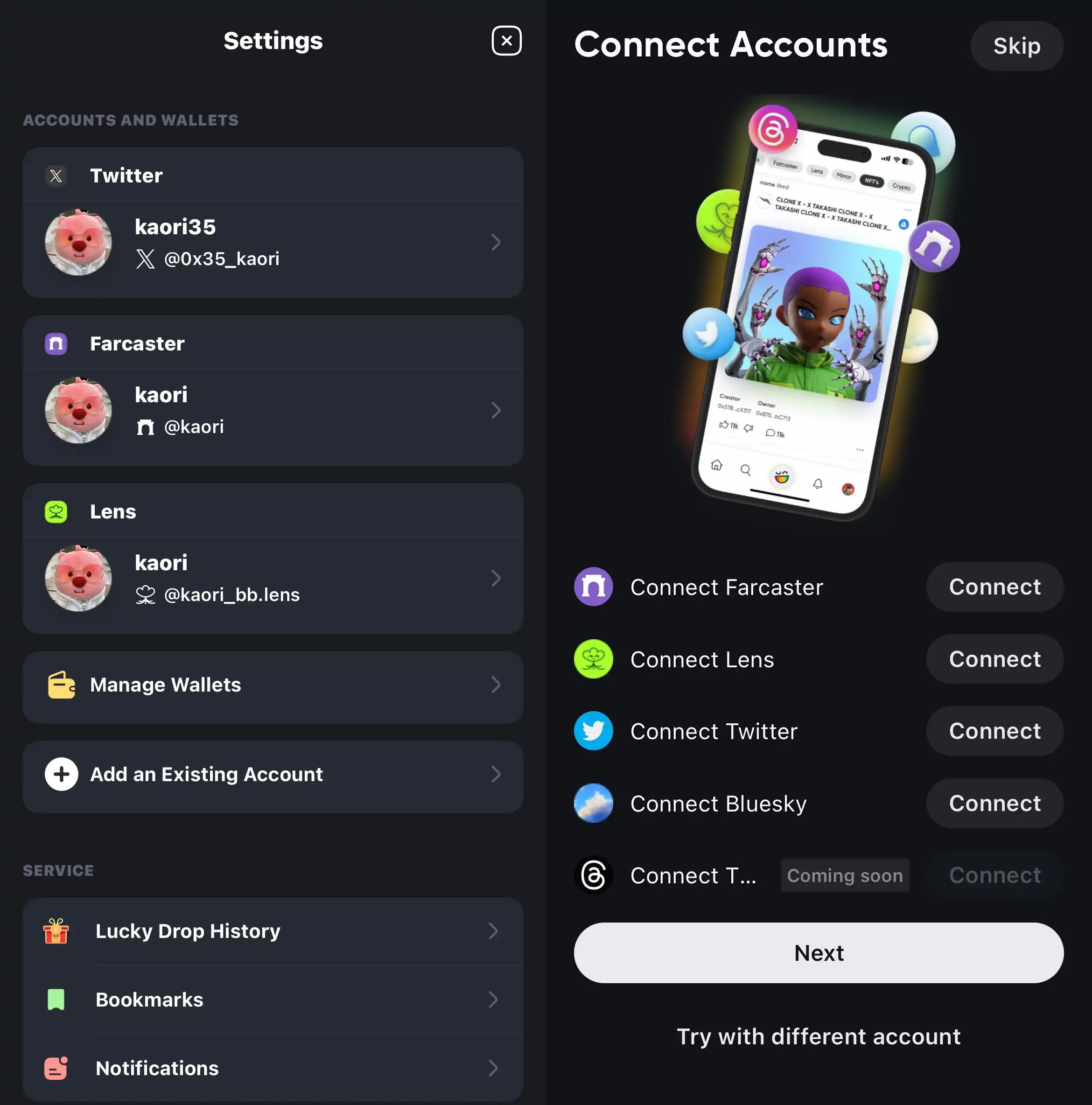
Social aggregation applications; left: Firefly; right: Yup
It is said that Vitalik is also using the Firefly client. For KOLs who have huge influence on different platforms, the settings of the aggregated client are sufficient to meet the need to synchronize content across all platforms in the simplest way.
In addition, aggregation clients such as Firefly are also building a social matrix for individual users. As Farcaster frontier explorer 0x luo.eth dit , the direction of Firefly is not only synchronous transmission, but more importantly, it is to aggregate on-chain activities. The purpose of aggregation is to redistribute information, connect different social graphs, find more interested people, and discover more interesting content.
These clients that already have a certain user base will have a simpler process and a smoother user experience when onboarding Farcaster. In addition, Twitter is still one of the social platforms with the highest content density. For most Crypto users, the existence of aggregated social clients has a clear product scenario, which further squeezes the market share of Farcaster native clients.
Where are the opportunities?
The Farcaster protocol is gradually opening up its core functions, thereby weakening Warpcasts exclusive advantages and encouraging the development of more third-party clients. Despite some operational challenges, the Farcaster protocol is still in the early stages of dividend discovery.
Warpcast is not perfect
Your enemy is not as powerful as you think. On Warpcast, you can often see complaints about its dictatorial operation, such as the black box of active badges and the supremacy of English. Although Warpcasts application interface is not much different from traditional social applications, the user experience is far from perfect. If you must fight hard for the front-end application and get a share of this pie, it may be a wiser choice to find the weakest point of Warpcast and optimize it.
A few days ago, Dan started a text AMA on Warpcast, and someone asked, Any suggestions for non-native English speakers who have trouble getting power badges (a Warpcast activity level mark)? Dan did not give an answer, but said, If you dont speak English, then the game is difficult to play. He said that the core of Warpcast is English, and if you are not a native English speaker, you can turn your attention to other clients. In the post, Dan also mentioned products such as the client aggregation application Firefly mentioned above.
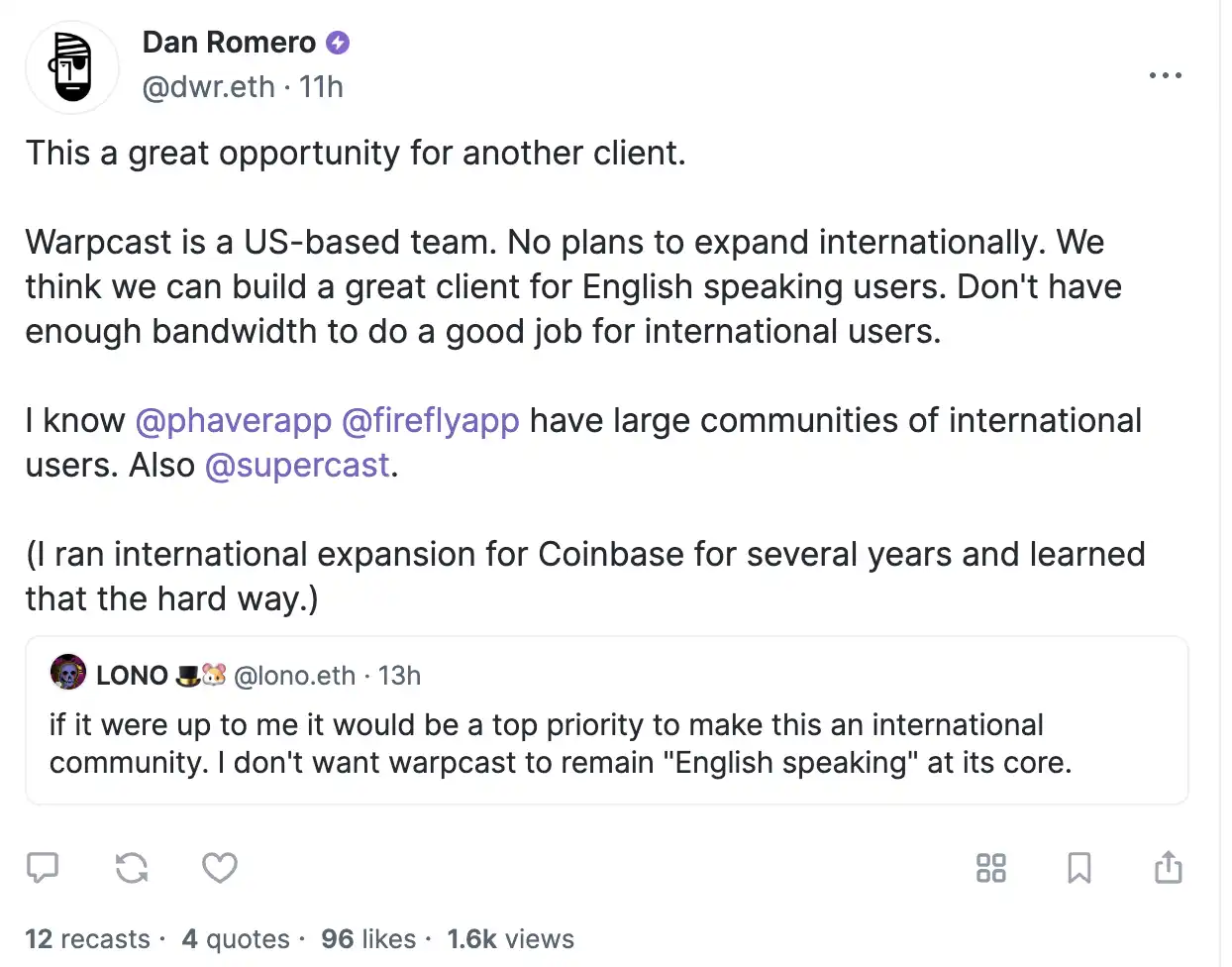
“Warpcast is a US-based team with no plans to expand internationally. We think we can build a great client for English users because there isn’t enough bandwidth to do a good job for international users.” Dan’s arrogant remarks often make community users unhappy. “The reason you were able to raise $150 million is the explosive growth of users from outside the United States. Imagine if Jesse Pollak said Base would only prioritize the Onchain Summer event for the US community, what would happen.”
In addition to being unfriendly to non-English users, Warpcast is also criticized by the community for its one-size-fits-all algorithm and opaque rating system.
In order to combat robots and spam, Warpcast has adopted settings such as active badges and priority mode. Users who get active badges are defined as active, interested in others, and not spam, but the evaluation criteria are not transparent. And priority mode means that after the user turns it on, you can only see the content of accounts you follow, accounts with active badges, and accounts with which the poster has interacted.
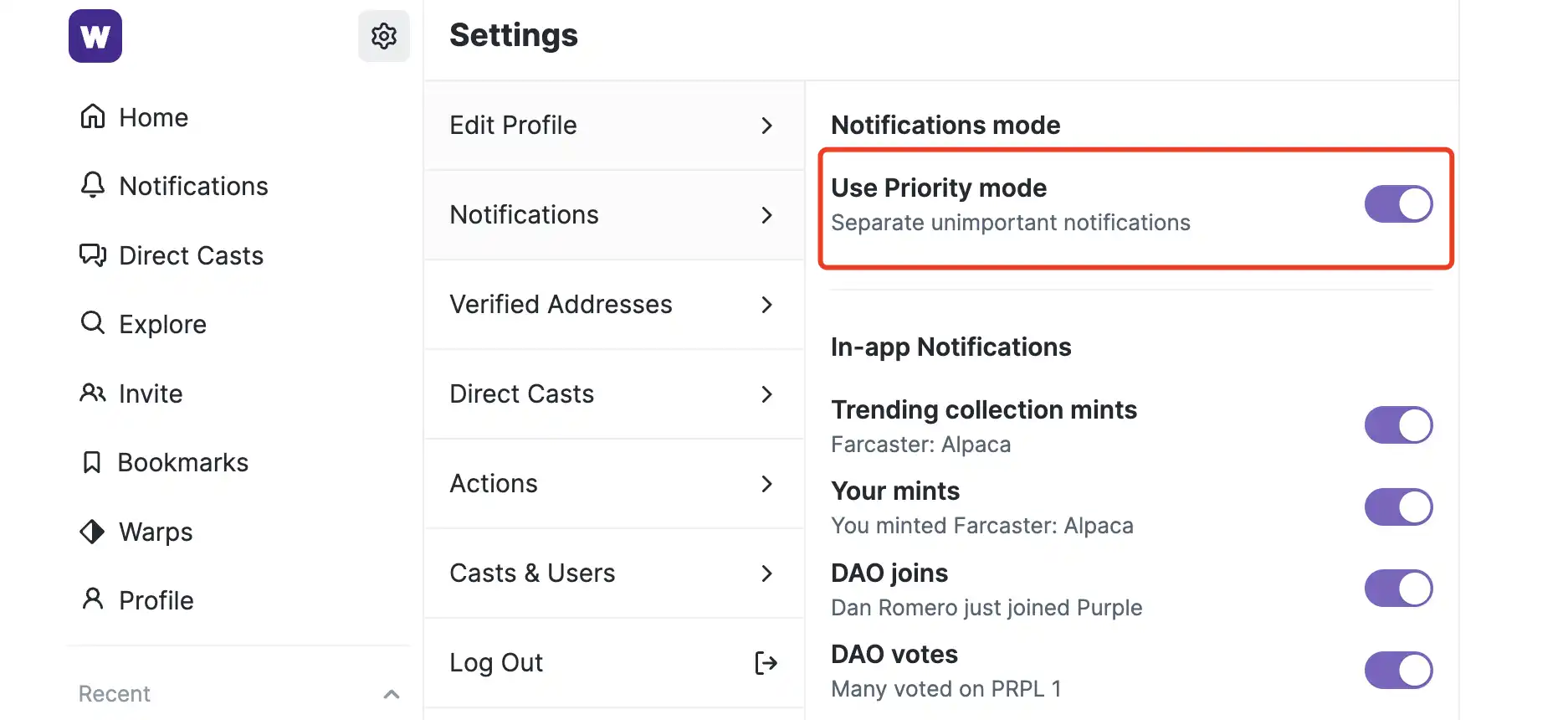
Warpcasts Priority Mode Button
Priority mode is enabled by default, which means that it is difficult for new users to gain traffic and interaction. Even those with active badges will be stripped of their badges if they interact too much with new users. Some people begin to see Warpcast as a closed circle of active badge users, or an echo chamber.
In addition, Warpcasts search function is not satisfactory. It only has the simplest chronological search and no advanced search function like Twitter. There is also no search function in Warpcasts core architecture Channels, which is a big flaw for content discovery.
In the early social media competition, MySpace was the leader. However, Facebook gradually attracted a large number of users through a simpler and user-friendly interface design, stronger privacy control and personalized experience, and eventually successfully surpassed MySpace to become the worlds largest social networking platform. In the search engine track, AltaVista once led the market with technical advantages and a large number of users. However, Google has greatly improved the user experience through more precise search algorithms and continuously optimized the relevance and speed of search results, which has completely changed the landscape of the search engine market.
Both cases show the importance of product thinking. Even if there is no first-mover advantage, as long as you really pay attention to user experience and provide better services, you can win user support and market recognition. For decentralized social products, social data is in the hands of users, which means that the decision-making power is also in the hands of users. Users will vote with their feet on which product is good.
The “protocol dividend” is strengthening
Despite the serious Matthew effect of Warpcast, the Farcaster protocol has now realized the need to be more open, bringing trend dividends to ecosystem developers.
The picture below shows a user being asked why he was forced to use Warpcast after purchasing Supercast. He replied, I can only use the private messaging function on Warpcast (Supercast founder Woj said Farcasters parent company Merkle didnt want to share). In addition, users cannot join channels with Supercast, and there are many things that can only be logged in with Warpcast.

As mentioned above, the private messaging function is currently limited to Warpcast. Channels are in a semi-decentralized state. Non-Warpcast clients can only display channels but cannot create channels. For example, if Weibo is Warpcast, then alt clients do not have the private messaging function, and can only view super topics, but cannot create super topics in their own clients.
In Farcaster’s financing announcement, officials said that the next priorities will be to increase the number of daily active users and to upgrade the Farcaster protocol, such as adding Channels and private messaging features to the Farcaster protocol itself.
Behind this incident, we can see that Farcaster is weakening applications and strengthening protocols. Opening up core functions is equivalent to weakening Warpcast, and not having an exclusive advantage is an encouragement to other clients.
By then, users will also create a channel on a third-party client, and all data can be run on multiple different clients. This is a good thing for clients like Supercast that have a certain user base. Combined with the advantages of Warpcast, it is expected to impact the first echelon in terms of user volume. For small and medium-sized vertical clients, a more open protocol will also increase the freedom of developers and complete more function settings.
In this way, developers do not need to reinvent the wheel, thus reducing development costs. The increased functionality of third-party clients will also weaken users spare tire mentality, giving them the opportunity to compete on the same level as Warpcast.
Open the pattern
The early dividend of an ecosystem lies in solving the pain points of the protocol. For Farcaster, enhancing decentralization and reducing development costs are urgent development needs, and now is the best time for innovators to get involved.
Sufficiently Decentralized is a slogan proposed by Farcaster co-founder Varun Srinivasan. This is also the goal that Farcaster has been committed to achieving, but the Farcaster protocol cannot be fully called decentralized at present.
In addition to the front-end layer that users directly contact and use, Farcaster also includes two parts : on-chain and off-chain. The on-chain is responsible for ID registration, storage registration and key storage, and the off-chain part is a server composed of Hubs. The concept of Hub is similar to a node on a chain. It runs on traditional hardware and is responsible for processing data that does not require on-chain confirmation to speed up response and reduce transaction costs. The main tasks include processing user-posted content, disseminating synchronized data, etc.
Running Farcaster Hubs is mostly a matter of developers building clients or developing frames to request data. And running Hubs requires costs, but the protocol layer itself has no economic incentives for Hubs operators. To some extent, this is one of the reasons why the Farcaster protocol is not so decentralized.
A year ago, a user asked if there was any incentive to operate the Farcaster Hub, and Varun replied that most application developers would run a Hub, just like each cryptocurrency trading platform runs a node. There is no economic incentive because we have not found a solution that is not easily manipulated, is the reason he gave for not having an incentive to operate the Hub.
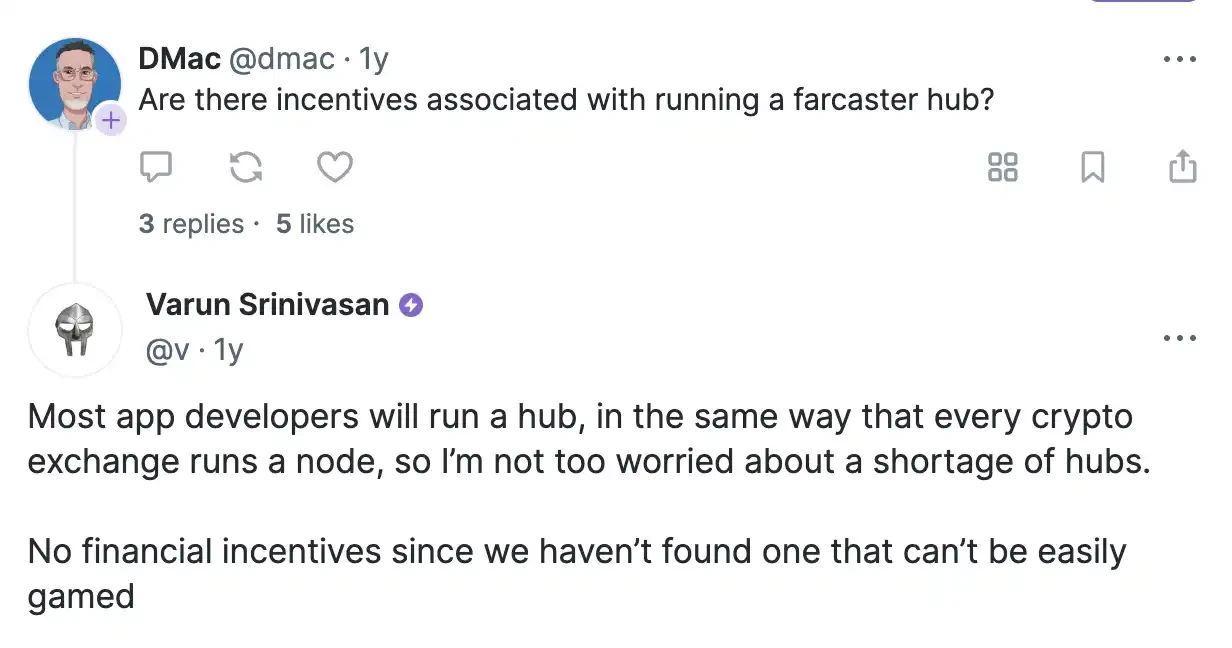
However, as the Farcaster protocol continues to develop, new solutions to the incentive problem have gradually emerged. Previously, running Hubs could regularly obtain some Warpcast internal liquidity tokens Warps, although Dan later suspended this incentive. On June 6, the EigenLayer official account forwarded an AVS new product called Ferrule, which aims to incentivize people to run Farcaster Hubs and enhance the decentralization of the Farcaster protocol.
Ferrules incentive is that Hub operators re-stake assets (such as ETH) into the Ferrule contract, and dynamically delegate assets to Hubs based on network behavior. A portion of the staking income will be distributed to Hub operators as rewards, and a portion of the storage account rental costs will also be paid. Hub operators staking ETH into the Ferrule contract means that their assets are tied to the security of the Farcaster protocol, and Hub inaction or malicious behavior will be financially punished through the slashing mechanism.
Lecture connexe : Can you make money running Farcaster nodes? Understanding Ferrules social re-staking economy
In addition, in order to manage state growth, Ferrule also introduces data sharding and routing mechanisms to ensure that no single Hub needs to store all data, thereby distributing the storage load across the entire network. It also creates a data location map to ensure efficient data retrieval.
By using the AVS framework, Ferrule can add an incentive layer to the Farcaster protocol. Currently, this idea proposed by the Anagram research team is in the implementation stage, and the proposer also stated in the public document that if developers are willing to complete this project together, they can join as EIRs (entrepreneurs-in-residence at startups).
There are many other third-party service startups in the Farcaster ecosystem, which have performed very well in terms of implementation and financing. The most representative one is the developer tool Neynar, which is a finalist for this years a16z Crypto Spring Startup Accelerator. On May 30, Neynar announced the completion of a $11 million Series A financing round with participation from a16z, Coinbase and other institutions.
Before Neynar, the only way to develop in the Farcaster protocol was to run a Hub, but it cost hundreds of dollars per month. Neyner essentially operates the Hub for developers, with a minimum cost of only $9 per month, greatly reducing developer costs.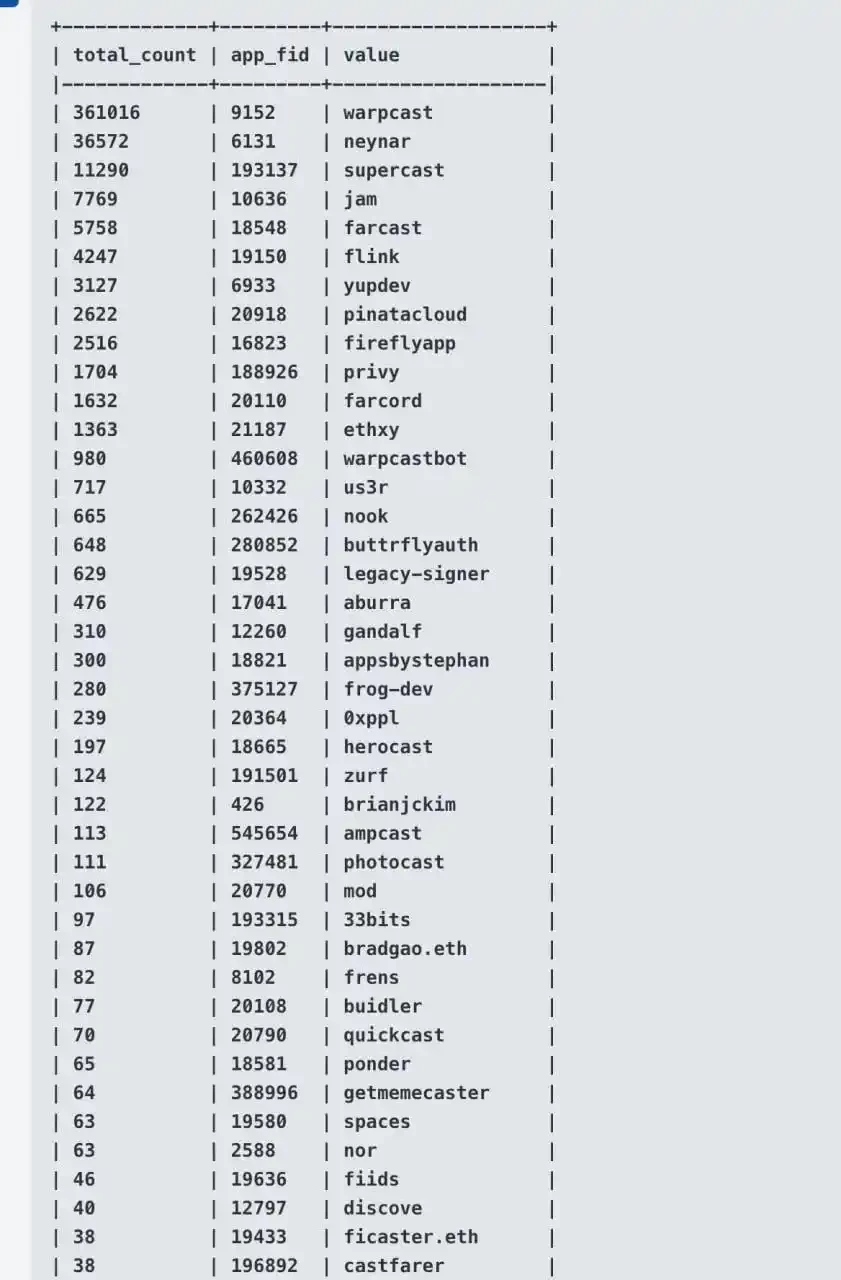
Farcaster protocol API service provider, Neynar has become the second largest independent user connection party; Source: Suji Yan
In addition to ecological entrepreneurial projects such as Neynar and Ferrule, the Farcaster team itself is also developing core issues such as network synchronization, data replication, and state growth. The purpose behind this is to enhance the decentralization level of the Farcaster protocol and prepare for the next order of magnitude of user influx. Therefore, this ecosystem still has many possibilities that are worth developers continued in-depth development.
Farcaster cant see the end
Dans phrase build your own client or use another client is not the antidote to make the Farcaster protocol more decentralized or grow users. The biggest significance of Warpcasts existence at present is to provide a possibility and a place for ordinary cryptocurrency users to be creative. Even for aggregation clients, there is still a lot of room for improvement in search functions and content integration.
The Farcaster ecosystem is gradually maturing. The openness of the protocol, the ever-increasing functionality, and the active participation of the community have laid a solid foundation for Farcasters future growth. At present, many products have been derived from the Farcaster protocol, such as the creator platform Paragraph, the content financialization application Jam, and the community task platform Bountycaster. It is possible that many products made by developers in the future will not be called Farcaster clients at all. They use the Farcaster protocol but do something completely different.
Make the pie bigger, and Farcaster is still a bonanza.
This article is sourced from the internet: Warpcasts exclusive advantage is becoming increasingly apparent, is there still a chance on Farcaster?
Related: With the explosion of AI, why is Web3 indispensable?
Original author: Teng Yan Original translation: Luffy, Foresight News A metaphor I’ve heard is that generative AI means discovering a new continent on Earth with 100 billion super-intelligent people willing to work for free. Unbelievable, isnt it? The 21st century will be known as the era of artificial intelligence for mankind. We are witnessing the early development of a new generation of technology that will change society more profoundly than the discovery of electricity, the harnessing of nuclear energy, or even the harnessing of fire. Don’t take my word for it, the King of England said this: What a time! Who knew that feeding an algorithm large amounts of data and superimposing huge computing resources would allow AI to develop astonishing new capabilities? It can now synthesize, reason, and actually…







